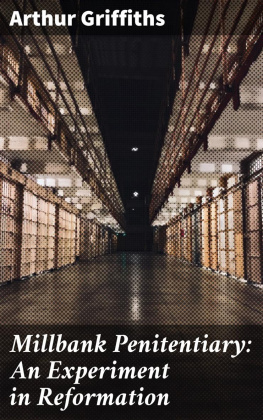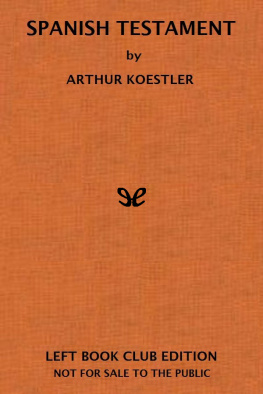The History and Romance of Crime
FROM THE EARLIEST TIMES
TO THE PRESENT DAY
Lock Emblem
THE GROLIER SOCIETY
LONDON
[Frontispiece]
Frontispiece
Spanish Prisons
THE INQUISITION AT HOME AND ABROAD
PRISONS PAST AND PRESENT
by
MAJOR ARTHUR GRIFFITHS
Late Inspector of Prisons in Great Britain
Author of
"The Mysteries of Police and Crime
"Fifty Years of Public Service," etc.
The Inquisitor-General and the Catholic Sovereigns
The mandate of expulsion of the Jews from Spain was issued by Ferdinand and Isabella in 1492. This edict no doubt originated with Torquemada, who was very bitter against the Jews. When he learned that a number of their leaders were in conference with the King and Queen, and offering an immense ransom, Torquemada rushed into the presence bearing a crucifix on high and crying in stentorian tones that the sovereigns were about to act the part of Judas Iscariot. "Here He is!" he exclaimed. "Sell Him again, not for thirty pieces of silver, but for thirty thousand!" and flinging the crucifix on the table he ran out in a frenzy. This turned the tables and the decree for expulsion was confirmed.
THE GROLIER SOCIETY
Spanish Prisons
THE INQUISITION AT HOME AND ABROAD PRISONS PAST AND PRESENT
by
MAJOR ARTHUR GRIFFITHS
Late Inspector of Prisons in Great Britain
Author of
"The Mysteries of Police and Crime
"Fifty Years of Public Service," etc.
Lock Emblem
THE GROLIER SOCIETY
EDITION NATIONALE
Limited to one thousand registered and numbered sets.
NUMBER
INTRODUCTION
A considerable portion of this volume is devoted to the Spanish Inquisition, which was, for three centuries, the most important force in Spain. Thousands were condemned by its tribunals, and its prisons and punishments make up a large part of the penal history of that country. Much exaggeration has crept into the popular accounts, but the simple truth must cause a shudder, when read to-day.
The institution was created to deal with heresy, that is, with a departure from the accepted canons. The idea that there can be unity in diversity was not understood. The spiritual and the temporal powers were closely related, and bishop and king, pope and emperor, all believed that uniformity was necessary. Hence, heresy was everywhere treated as high treason not only to the Church but to the State as well. The Spanish Inquisition was a state affair as well as an ecclesiastical court.
We shall see that the jurisdiction of the Inquisition was not confined to the suppression of heresy. Many crimes which to-day are purely state concerns, were then punished by it, including bigamy, blasphemy, perjury, unnatural crimes, and witchcraft. The Spanish Inquisition deserves credit for discouraging persecution of the last named offence, and thereby saved the lives of thousands, who, in any other state would have been executed.
The adaptation to penal purposes of ancient buildings, to be found throughout the length and breadth of Spain, was very common, as these were immediately available although generally unsuitable. Chief among them are the many monastic buildings vacated when the laws broke up religious houses in Spain and which were mostly converted into prisons, but little deserving the name. Some of these houses have been utilised as gaols pure and simple; some have served two or more purposes as at Huelva, where the convent-prison was also a barrack.
Spain has been slow in conforming to the movements towards prison reform. She could not afford to spend money on new constructions along modern lines, and the introduction of the cellular system is only of recent date. The model prison of Madrid, which has replaced the hideous Saladero, was only begun in 1887. But a few separate prisons had already been created, such as those of Loja, Pontevedra, Barcelona, Vittoria and Naval Carnero. These establishments are new to Spain but their methods and aims are too well known to call for fresh description. More interest attaches to the older forms that have so long served as places of durance.
CHAPTER I
THE INQUISITION IN SPAIN
Beginning and growth of religious persecutionTemporal power of the PapacyPope Innocent III creates the first "Inquisitors"Domingo de Guzman founder of the InquisitionFounder of the Dominican Order of FriarsThe "ancient" InquisitionPenances inflictedPersecution of the Jews in SpainInstitution of the "modern" Inquisition under Ferdinand and IsabellaHeadquarters at SevilleFrequent autos da fThomas de Torquemada the first Inquisitor-GeneralThe privileges of the officeTorquemada's life and characterSufferings of accused persons.
The record of religious persecution furnishes some of the saddest pages in the world's history. It began with the immediate successors of Constantine the Great, the first Christian prince. They promulgated severe edicts against heretics with such penalties as confiscation, banishment and death against breaches of Catholic unity. In this present tolerant age when every one may worship God after his own fashion, it is difficult to realise how recent a growth is toleration. For more than six centuries the flames of persecution burned fiercely throughout Christendom, lighted by the strong arm of the law, and soldiers were constantly engaged to extirpate dissent from the accepted dogmas with fire and sword. The growth of the papacy and the assumption of the temporal power exalted heresy into treason; independence of thought was deemed opposition to authority and resistance to the universal supremacy of the Church. The popes fighting in self-defence stimulated the zeal of their followers unceasingly to stamp out heresy. Alexander III in the 12th century solemnly declared that every secular prince who spared heretics should be classed as a heretic himself and involved in the one common curse.
When the temporal power of the popes was fully established and acknowledged, the papacy claimed universal sovereignty over all countries and peoples and was in a position to enforce it by systematic procedure against its foes. Pope Innocent III, consumed with the fervour of his intolerant faith, determined to crush heresy. His first step was to appoint two "inquisitors" (the first use of the name) and two learned and devout friars, who were really travelling commissioners, were sent to perambulate Christendom to discover heresy. They were commended to all bishops, who were strictly charged to receive them with kindness, treat them with affection, and "help them to turn heretics from the error of their way or else drive them out of the country." The same assistance was expected from the rulers of states who were to aid the inquisitors with equal kindness.




